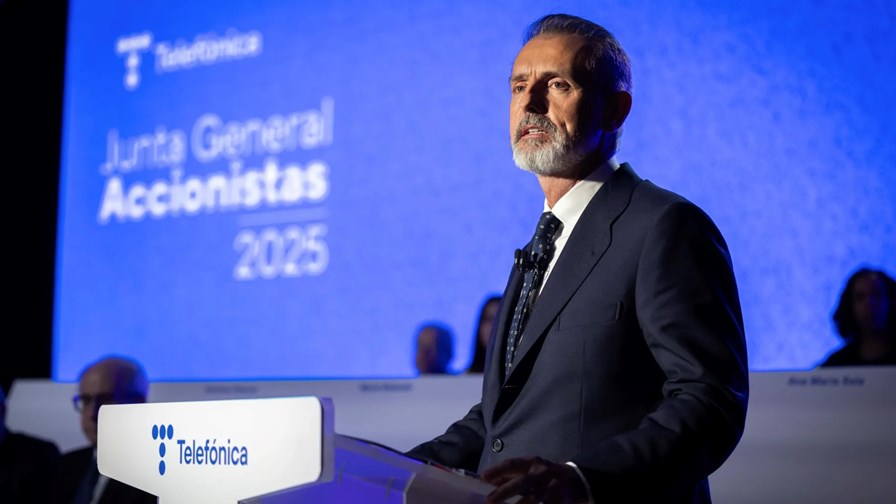
Telefónica executive chairman Marc Murtra.
- Marc Murtra was made Telefónica’s new CEO in January, an appointment that now has the blessing of shareholders
- He has already revamped the telco’s top executive team
- Now he is preparing an “ambitious” review that will focus on gaining greater scale in Europe and simplifying the telco’s operations
It is looking like 2025 will be a year of major change and upheaval at Telefónica, the giant Spanish telco that has significant operations across Europe and Latin America. Following the official approval by the operator’s investors of his appointment as the new CEO, Marc Murtra told the company’s Annual General Shareholders’ Meeting that a major strategic review was underway and would be shared later this year.
Murtra was named as Telefónica’s new executive chairman in January when dominant shareholders effectively ousted the former chief José María Álvarez-Pallete, a move that caught the telecom sector by surprise. Murtra immediately got to work and, even before his ratification at the shareholders’ meeting, he had revamped the telco’s top executive team, appointing a new chief operating officer (COO) as well as new heads for Telefónica Tech (the Spanish telco’s digital enterprise services division) and the company’s digital services division – see Telefónica rings top table changes.
With a new team in place, Murta is now planning bigger and broader changes.
He told the shareholders’ meeting that a major and “ambitious” strategic review is underway and that it will revolve around cementing Telefónica – a company with “enormous potential” – as a European powerhouse.
He noted that the review will centre on five key principles: Changes in Europe; putting customers at the centre of everything; technology and operational excellence; disciplined industrial logic; and the creation of value for customers, employees and shareholders.
With those principles in mind, Telefónica has three key priorities, noted Murtra.
The first is a regional focus. “Our priority will be Europe, Europe and Europe; we will maintain our leadership position in Brazil as a core market and we will focus on what we know how to do as an industrial operator.” So, we can expect to see further divestments by Telefónica in Latin America (with Brazil being the key exception) – a process that is already underway, with the business in Colombia having been sold, a deal having been struck in Argentina and a divestment expected in Mexico, but that M&A effort now looks like it might be broadened and accelerated.
That focus will in part be enabled, at least in Telefónica’s view, by the kind of market consolidation that lawmakers have traditionally blocked. “We consider intra-market consolidations to be economically profitable. There will be no European consolidation… without prior intra-market consolidation and without economic rationality,” he noted.
Does Murtra know something we don’t? Is the European Commission about to relax its M&A rules? We’ll come back to that.
The second priority is to “maintain sound financial discipline and to simplify the company”, while the third is “operating under parameters of technological and operational excellence”.
As if to ward off suggestions that this might involve widespread automation and mass layoffs, Murtra noted that to achieve the company’s goals, “people will be key”.
Murtra explained: “I am firmly committed to… strategically and energetically push[ing] our company to reach its full potential for shareholders, for Telefónica professionals and for Europe as a whole,’ he remarked.
Strengthening Europe appears to be a big deal for Murtra, who took the opportunity once again to pressure the European Commission into relaxing rules and regulations, especially around M&A.
“Our opinion is that the high level of fragmentation in the telecommunications sector in Europe, unique in the world, and the excessive regulation, also unique in its intensity, have uprooted the possibility that European telcos could have been technological giants capable of competing with their US and Chinese counterparts, ensuring Europe’s sovereignty and productivity,” noted the CEO.
“The time has come for the large European telecommunications companies to consolidate and grow to a scale that will allow them to invest, innovate and attract talent in a decisive way”. That consolidation “must begin within countries, otherwise it will not make economic sense.” Once telcos are able to swallow smaller local rivals they will achieve the scale needed to make enough cash to invest in cutting-edge networks and the best staff which, in turn, will “create sufficient technological capacity to reinforce our strategic autonomy, increase our productivity and improve the lives of our citizens”, he added.
Murtra and Telefónica are not alone, as all of Europe’s main telcos are echoing the sentiment at any opportunity: Deutsche Telekom’s CEO Tim Höttges was banging the same drum at his company’s annual shareholders’ meeting in Bonn on 9 April. “I believe we need an efficient state. A state that accelerates rather than stalls. A state that advises rather than restricts. Where the citizens are customers rather than applicants. But complaining doesn’t achieve anything. Nor does always pointing fingers at politicians or regulators. Calling for action takes silver. But action itself takes the gold.”
Clearly Murtra and Höttges believe that change is in the air in Europe. So far, though, there’s no such word from Brussels.
- Ray Le Maistre, Editorial Director, TelecomTV
Email Newsletters
Sign up to receive TelecomTV's top news and videos, plus exclusive subscriber-only content direct to your inbox.
Subscribe